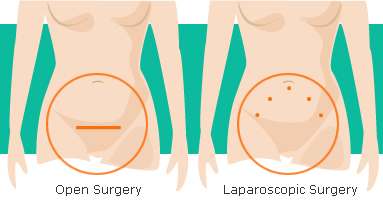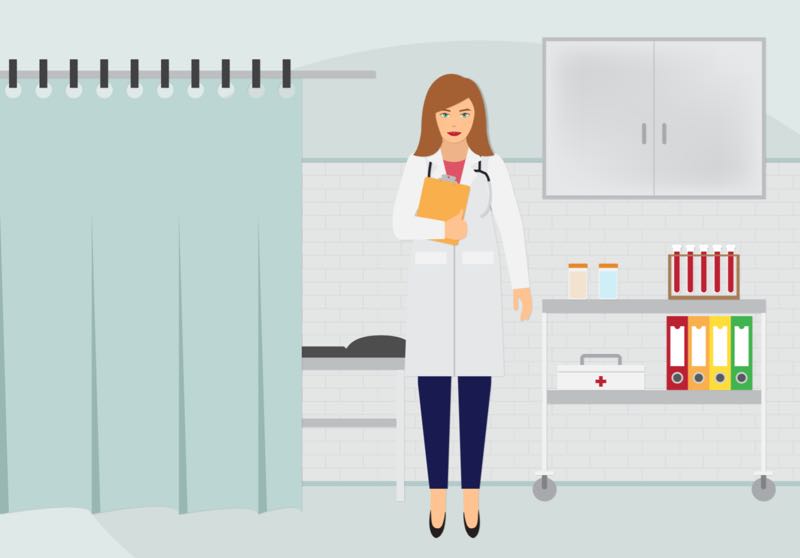Not even sure what questions to ask about gynaecological surgery? Here are four questions to discuss with your GP. Here are also some answers about the difference between laparoscopic surgery and open surgery.
Okay. You need gynaecological surgery…now what?
Let’s start with the fact that you are not alone. Millions of women each year undergo gynaecological surgery. As a specialist in Fertility and Gynaecology, I help my patients and their families to make the best possible decision for them.
If you need gynaecological surgery, most likely you will need to make a decision between either a laparoscopic (aka keyhole surgery or minimally invasive surgery) or open surgery procedure.

Now, to feel comfortable with any surgical procedure you need to know the treatment options, the risks and the benefits of each option. Depending on your particular condition, your age, your family plan, and (sometimes) where you live, your treatment options will vary.
1. What treatment options do I have?
Open Surgery: The surgeon uses a scalpel to make one large abdominal incision that exposes the tissues and structures inside for examination and surgery.
Laparoscopic Surgery: One or several small incisions of around 0.5 to 1.5 cm are made farther away from the site to allow the threading of small, thin instrument called a laparoscope through the incision to the operational site for examination and surgery.
You may have never even heard the word laparoscopic before, but it is a common, safe and effective method. It is used for treatment of several gynaecological issues such as uterine fibroids, ovarian cysts and endometriosis Other terms used for laparoscopic surgery are minimally invasive surgery and keyhole surgery.
2. What are the Risks and Advantages to Laparoscopic Gynaecological Surgery?
Actually, laparoscopic surgery is not equal to open surgery – a smaller wound = smaller scar.
Because the incision in a laparoscopic procedure is so much smaller (think keyhole) than in a traditional open surgery the scars are significantly reduced. To be honest, a smaller wound also reduces the risk of infection or herniation.

A smaller incision = less pain and bleeding. Typically, patients also experience less pain and bleeding after a laparoscopic surgery than with open surgery. The smaller incision also reduces the risk of bleeding during surgery and reduces the pain medication prescribed for recovery.
Smaller incision = reduces chances of infection. Exposure of the internal organs to external contaminants is significantly reduced in laparoscopic surgery compared with open surgery, therefore reducing the risk of postoperative infection.
These all add up to… less time in the hospital. Laparoscopic surgery often requires a shorter hospital stay than traditional open surgery.
3. What are the risks involved with gynaecological surgery?
No doubt, you know that surgery always involves some level of risk.
Whether you are considering a cystectomy to remove ovarian cysts, a myomectomy to treat uterine fibroids, or a diathermy and resection for endometriosis, your peace of mind is just as important as the treatment you choose.
Usually, the risks of gynaecological surgery are dependent on the surgical approach and your individual characteristics (age, health, other conditions).
- Bleeding or haemorrhage
- Infection
- Thromboembolism (a blood clot that breaks loose and travels to the brain, heart, lung, GI tract, kidney or leg)
- Damage to surrounding blood vessels or viscera (bladder, liver, pancreas or intestines)
Gynaecological surgery may also impact your urinary tract, uterine wall, and your fertility. Ask your GP about the risks involved with any gynaecological surgery option presented for your condition.
4. Ask the surgeon, “What is your experience with gynaecological surgery?”
Experience counts. That being said, ask your GP about the surgeon’s experience with the procedure you choose and what to expect from them. Then, ask your surgeon about their approach and make sure you feel comfortable with what they tell you.
Still have questions about which surgical option is best for you? Call my office to make an appointment: 08 9388 7780.

Useful links
Have a Gynaecological problem? Read about common problems and treatments I can assist you with.
